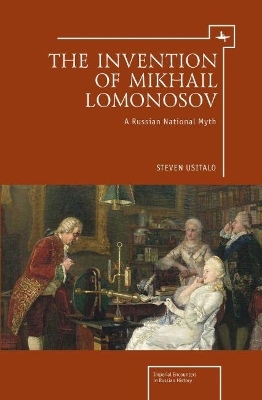
The Invention of Mikhail Lomonosov
A Russian National Myth
Seiten
2018
Academic Studies Press (Verlag)
978-1-61811-806-6 (ISBN)
Academic Studies Press (Verlag)
978-1-61811-806-6 (ISBN)
Explores the evolution of Lomonosov's imposing stature in Russian thought from the middle of the eighteenth century to the closing years of the Soviet period. The book reveals much about the intersection in Russian culture of attitudes towards the meaning and significance of science, as well as about the rise of a Russian national identity.
This study explores the evolution of Lomonosov’s imposing stature in Russian thought from the middle of the eighteenth century to the closing years of the Soviet period. It reveals much about the intersection in Russian culture of attitudes towards the meaning and significance of science, as well as about the rise of a Russian national identity, of which Lomonosov became an outstanding symbol. Idealized depictions of Lomonosov were employed by Russian scientists, historians, and poets, among others, in efforts to affirm to their countrymen and to the state the pragmatic advantages of science to a modernizing nation. In setting forth this assumption, Usitalo notes that no sharply drawn division can be upheld between the utilization of the myth of Lomonosov during the Soviet period of Russian history and that which characterized earlier views. The main elements that formed the mythology were laid down in the eighteenth and nineteenth centuries; Soviet scholars simply added more exaggerated layers to existing representations.
This study explores the evolution of Lomonosov’s imposing stature in Russian thought from the middle of the eighteenth century to the closing years of the Soviet period. It reveals much about the intersection in Russian culture of attitudes towards the meaning and significance of science, as well as about the rise of a Russian national identity, of which Lomonosov became an outstanding symbol. Idealized depictions of Lomonosov were employed by Russian scientists, historians, and poets, among others, in efforts to affirm to their countrymen and to the state the pragmatic advantages of science to a modernizing nation. In setting forth this assumption, Usitalo notes that no sharply drawn division can be upheld between the utilization of the myth of Lomonosov during the Soviet period of Russian history and that which characterized earlier views. The main elements that formed the mythology were laid down in the eighteenth and nineteenth centuries; Soviet scholars simply added more exaggerated layers to existing representations.
Steven Usitalo (PhD McGill University) is an associate professor at the Department of History, Northern State University. He is the co-editor with William Benton Whisenhunt of Russian and Soviet History: From the Time of Troubles to the Collapse of the Soviet Union (2008).
| Erscheinungsdatum | 05.08.2018 |
|---|---|
| Reihe/Serie | Imperial Russia |
| Zusatzinfo | Illustrations |
| Verlagsort | Brighton |
| Sprache | englisch |
| Maße | 155 x 234 mm |
| Themenwelt | Literatur ► Biografien / Erfahrungsberichte |
| Literatur ► Briefe / Tagebücher | |
| Sachbuch/Ratgeber ► Geschichte / Politik | |
| Geisteswissenschaften ► Archäologie | |
| Geschichte ► Allgemeine Geschichte ► Neuzeit (bis 1918) | |
| Geisteswissenschaften ► Geschichte ► Regional- / Ländergeschichte | |
| Geschichte ► Teilgebiete der Geschichte ► Technikgeschichte | |
| ISBN-10 | 1-61811-806-4 / 1618118064 |
| ISBN-13 | 978-1-61811-806-6 / 9781618118066 |
| Zustand | Neuware |
| Haben Sie eine Frage zum Produkt? |
Mehr entdecken
aus dem Bereich
aus dem Bereich
Europa 1848/49 und der Kampf für eine neue Welt
Buch | Hardcover (2023)
DVA (Verlag)
CHF 67,20
Giordano Bruno - ein ketzerisches Leben
Buch | Hardcover (2024)
C.H.Beck (Verlag)
CHF 41,85


